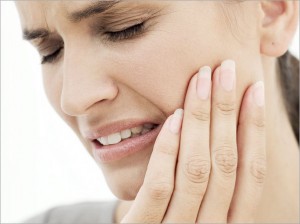My tooth is sensitive. Should I visit the dentist?
Tooth sensitivity can be painful—especially if it doesn’t seem to get better over time. Sometimes, we even try to ignore the pain in hopes it will get better without a visit to the dentist. Did you know that pain in your mouth is actually a protective response from your body to inform you that something is wrong?
The most common cause of sensitive teeth is exposure to hot or cold foods/drinks. Sometimes even a breath of cold air can make sensitive teeth hurt. Enamel is a mineral that protects your teeth. Grinding your teeth or splurging on unhealthy foods or drinks (such as soda pop and acidic drinks) wears down that enamel and exposes the dentin. In some cases, a dentist can repair the worn-down enamel with services such as tooth bonding, crowns, and other procedures.
If your gums are swollen and red around the base of your teeth, you may have Gingivitis. Gingivitis (or gum disease) is commonly caused from the lack of brushing, flossing, and rinsing your teeth regularly. Patients with gingivitis often have inflamed and sore gums, commonly pulled back and exposing the roots of their teeth which can cause sensitivity. It can usually be reversed with personal daily brushing and flossing of your teeth. Regularly scheduled cleanings with your dental hygienist are recommended to prevent lasting damage.
Plaque buildup at the base of your teeth can cause sensitivity. Sitting plaque often hardens and turns into tartar at the base of your teeth, contributing to sensitivity. The best option is to not let it start in the first place. Brushing, flossing and rinsing daily often do the trick. Limiting sugar/starch/soda can really help too. Exposure to these kinds of food causes harmful acids that contribute to tartar and weaken your enamel. Controlling your diet is a key solution. Smoking is also a big contributor to tartar buildup. Using antiseptic mouthwash is also a great way to help keep away unwanted plaque and tartar.
Believe it or not, age is a factor in tooth sensitivity. Though they are strong and reliable, teeth wear down over time. The best way to keep your gums and teeth in good shape is to take good care of them and eat a well balanced diet. Keeping your mouth moist can help. Saliva actually helps clean your teeth and keeps them from decaying. As you grow older, your mouth gets drier. Make it a goal to drink more water. Besides the great health benefits it will have on your skin/body, it will help your mouth stay moist. If you think a prescription medication is the cause for a dry mouth, talk to your doctor about possibly changing them. I have had patients try Slippery Elm for dry mouth (they come in lozenge form), but do not use it within an hour of other medications because it can decrease the medication effectiveness.
Your bite may be off. Bite problems can cause pain and discomfort. If left untreated, an “off bite” can break down the important enamel protecting your teeth. To check if your bite is off, give yourself the good ol’ “Clench Test.” To do this, free your mouth from any foods or substances. Close your teeth together and bite hard. If this clenching motion causes any discomfort, you may want to schedule an appointment with a dentist to address the situation. There are a plethora of options to fixing an off bite such as braces, Invisalign, Inman aligners, etc.
“I just had my teeth whitened and am now in pain. Is that normal?” Yes. Teeth are particularly sensitive after they have been in contact with high concentrations of a bleaching product. Usually this pain is temporary and will go away after the bleaching treatment stops. However, when teeth are bleached frequently, a tooth can be subject to pain for longer periods of time. If this is the case and you are using a bleaching product at home, try to use a lower concentration of the whitening product. Increase the time between treatments and be gentle on your teeth. If your whitening procedure is being done in the dental office, maintain good communication with your dentist and tell them if you are in pain. They will help you find the best solution to a bright white smile.
If your tooth is in pain, you may have a cavity. The first sign of decay may be felt when you bite into something sweet, very hot, or very cold. If the inside of your tooth has become irritated, it may cause pain–an indicator that you need to visit the dentist to get it repaired. In the office, they will use special x-rays to determine which tooth contains the cavity and needs to be fixed.
My tooth is still sensitive. What should I do? Visit the dentist. Describe the pain and how often it ails you. Let your dentist know if you’ve noticed a specific diet or lifestyle habit that usually coincides with your teeth being sensitive. Your dentist will work along side you to find a solution that will help you become pain free.
http://www.webmd.com/oral-health/guide/tooth-sensitivity
http://www.mouthhealthy.org/en/nutrition/food-tips/9-Foods-That-Damage-Your-Teeth
http://www.nidcr.nih.gov/oralhealth/Topics/GumDiseases/PeriodontalGumDisease.htm
http://www.webmd.com/oral-health/guide/tartar-dental-calculus-overview?page=2
http://www.webmd.com/oral-health/teeth-gums-age
http://www.webmd.com/vitamins-supplements/ingredientmono-978-slippery%20elm.aspx?activeingredientid=978&activeingredientname=slippery%20elm
Functional Occlusion: From TMJ to Smile Design, by Peter E. Dawson
ADA Patient Smart: Tooth Whitening, by Dr Jordan Johnson


